'The Umbrella Academy' showrunner Steve Blackman on the advantages of setting S2 in the 60s and his plan for S3 (exclusive)

When we last saw the superhero siblings of Netflix’s hugely popular The Umbrella Academy, it was 2019 and they were saving the world from impending doom. In stopping the apocalypse, the crew have accidentally travelled back to 1960s Dallas for the second season and must now stop a new armageddon of the own making. Again.
Arriving separately, across different years, we find them each having started new ‘60s-set lives: Diego (David Castañeda) is on a mission to save JFK from assassination, Allison (Emmy Raver-Lampman) has found her voice in the civil rights movement and Klaus (Robert Sheehan) has used his powers to start a cult. He hasn’t yet become his own grandfather, but it seems likely.
The heroes’ return is twisty and stylised and funny and dark and crucially, tons of fun.
The man behind the culty, comic book chaos is showrunner Steve Blackman, adapting the graphic novel source material by Gerard Way and Gabriel Ba, drawing inspiration from the comics while deviating in plot for this season, too.
Ahead of The Umbrella Academy season two’s premiere on 31 July, Yahoo Movies UK spoke to Blackman to uncover the heated time travel arguments that go on in the show’s writers’ room, why it was important to tell some of this season’s stories in particular, and the beginning, middle and end he already has plotted out for a third season…
This second season sees the gang travel back to the 1960s. When you're dealing with not only time travel, but superpowers, you must have to have some really strict rules in place to make sense of the logic of that world. What are the strict rules of the Umbrella Academy universe?
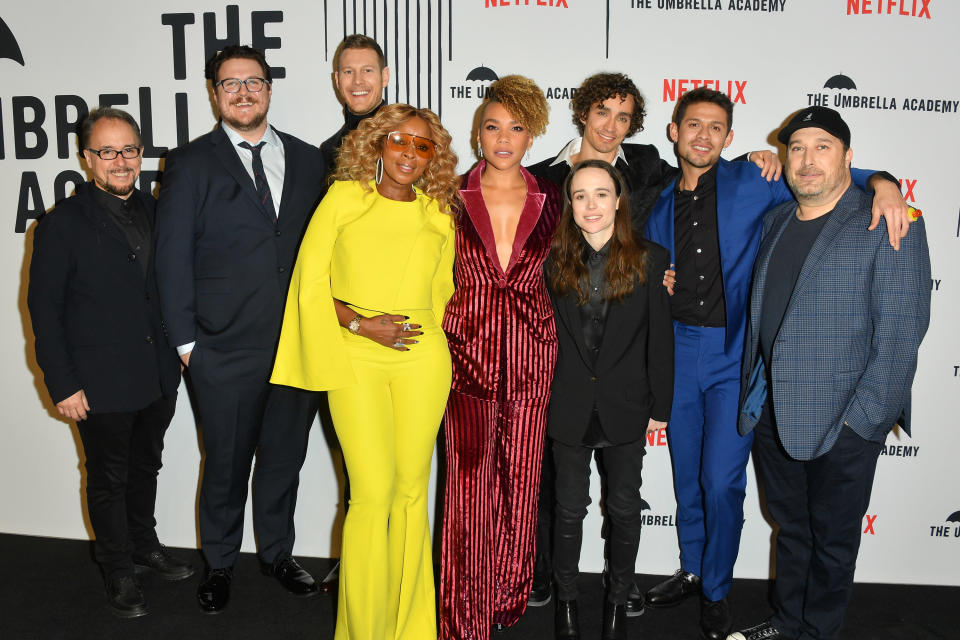
Steve Blackman: Well, we do make a few rules, and I had to make a few conceits for the show. For example, none of their powers are absolute. They can't just go on forever. The early thing I did was, I made sure that, for example, Five (Aidan Gallagher) couldn't blink indefinitely, because then it becomes an absolute power. All of them grow tired, and have to recharge their batteries, which makes them much more vulnerable.
We also had to make rules about time travel, There are so many discussions we had in the room, and fights I had with the writers, because we all have a different interpretation of time travel. We had to decide on one set of rules of: Are there multiple timelines? Can you exist with yourself in the same time period? All those had to be sorted out, and we came up with our own rules that some people may not buy, but it works for our show.
Could you talk us through what those rules you decided on are for The Umbrella Academy?
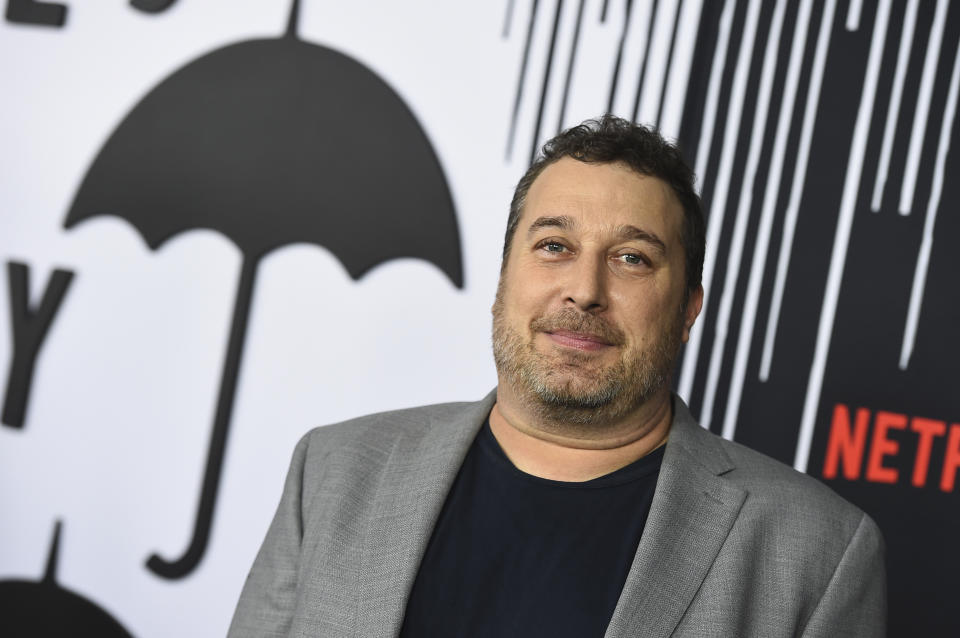
We talked about, for example, if I go back in time, could I meet myself? And then we said you could meet yourself, but there has to be a repercussion to that. And in season two, we deal with the repercussions of existing with yourself. It does not go well, you both end up going crazy. And it's a lot of fun. It was important to set those kinds of rules, too.
Because without those rules, then anything goes and then the world starts becoming less and less credible. So the rules help to drive the narrative, and also drive the stakes of time travel and being superheroes. It can't all be perfect, any more than these characters are perfect. They're all dysfunctional... in every way.
Even though the things that are happening are set in the ‘60s, elements like the Civil Rights storyline are so topical today. Did it feel like that when you were putting it together?
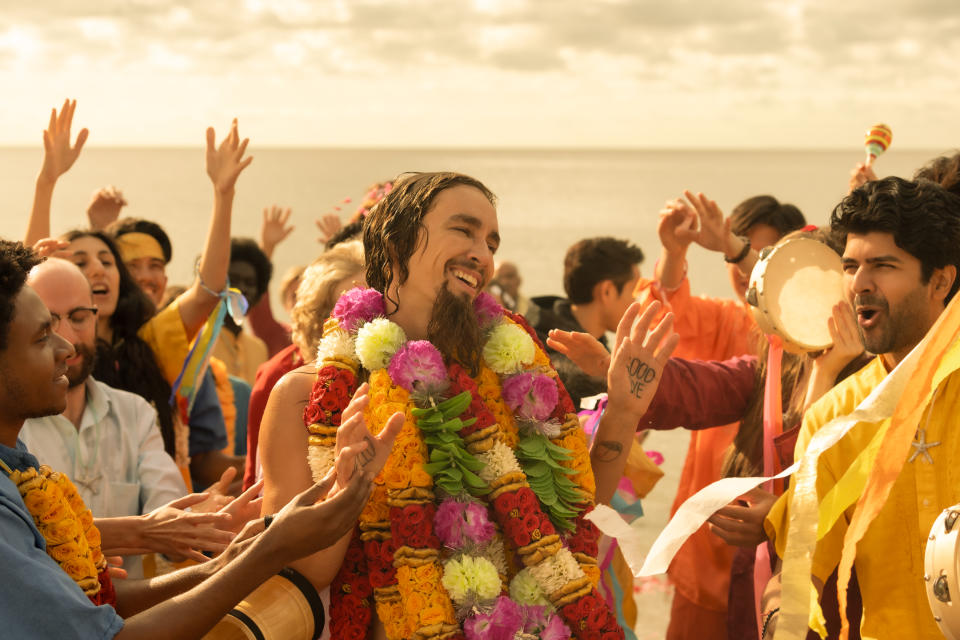
We did. I mean, I couldn't have predicted the rise of the Black Lives Matter movement here, which has been fantastic. But I knew early on, I couldn't send Allison, played by Emmy Raver-Lampman, back in time to the 1960s during the segregation period and not play a story about it. I mean, a woman of colour couldn't even go into a store, because there were whites-only stores.
So it was important for me to, within the context of our show, even if the show was heightened, with superheroes and stuff, to tell a real story about a woman of colour in the south. So, I came up with the idea that her husband was a civil rights man, and he was working with her, and they work together. And I thought it was important to do the sit-in in Sadler's.
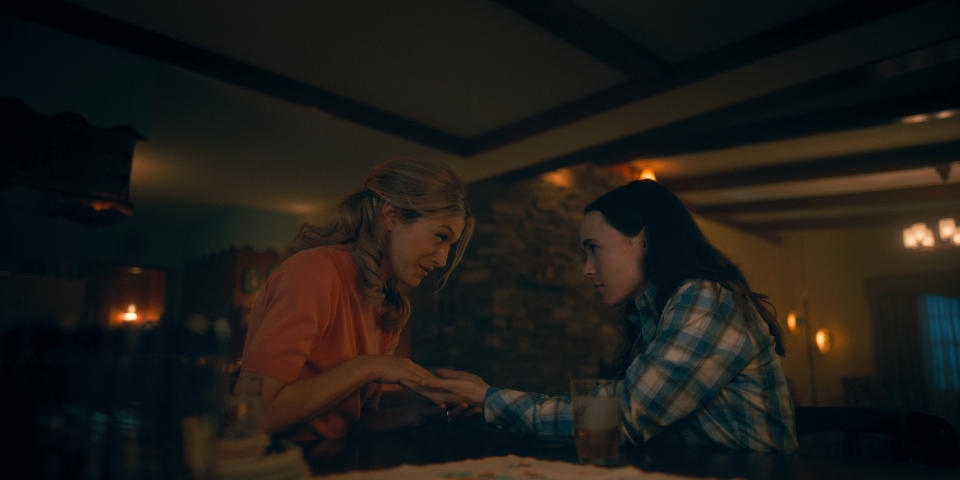
Also, I wanted to deal with a character who is gay or queer, to show what that was like to be in the ‘60s, not just in the south – but in Texas, you could go to prison if you are gay or queer. I wanted to do a story with Vanya (Ellen Page) and this other woman, Sissy (Marin Ireland), and it was important to tell a love story in the real circumstance of that time period.
Coming up with those different stories of where we find each of the characters in the Sixties, that gives you so much room to explore all those different potential storylines. Did you have any potential areas which you originally thought about investigating with one of them and ended up not settling on?
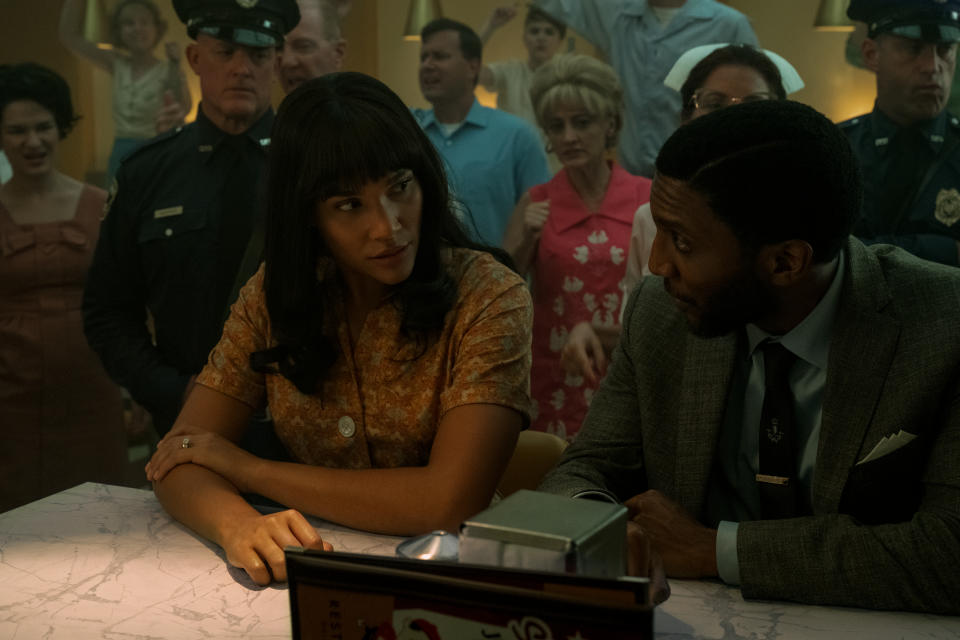
Not really, I knew early on that I needed an interesting way into the season because had they just arrived together as a group, again, the team would be right back together. What I wanted to do was make it hard on them. I also wanted to see what they would do with this time when each of them thinks the others are dead. Everyone thinks they're alone in the world, and they're stuck. They're marooned on an island. It was fun to sort of see them go.
I stuck to my original ideas because I thought Klaus's cult worked really well for him. I knew I wanted Allison to be in civil rights and get married. And each of them are there for less time. For Diego, I knew he would instantly jump on trying to save Kennedy because he has a hero complex. But I didn't try a lot of other ones. I knew the ones I wanted.
We get to see more of Ben’s story this season, too. Why was that important to include?
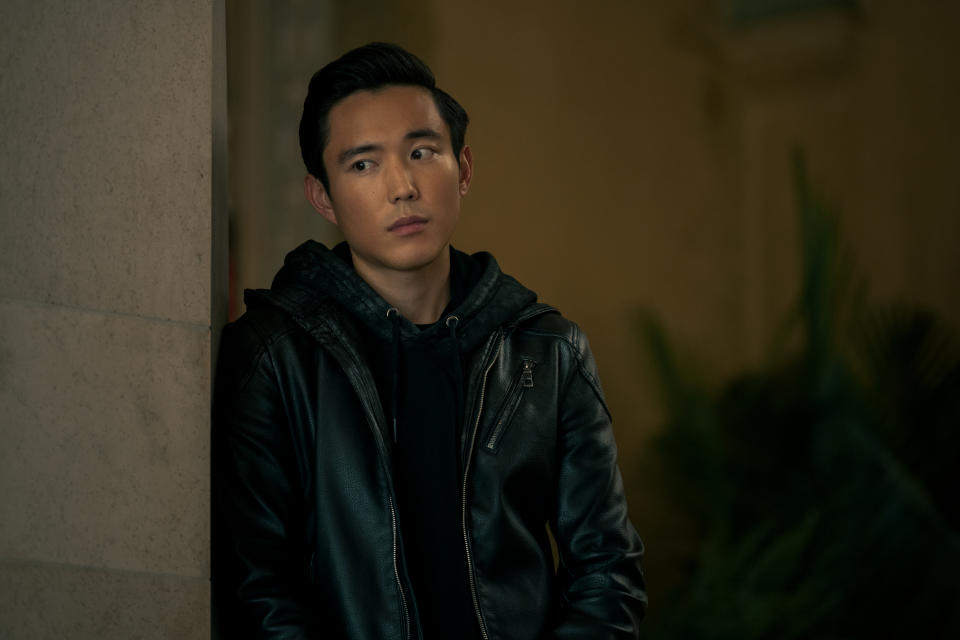
I love the character of Ben (Justin H. Min). I think the fans love this character. He's the deepest thinker and the sweetest guy of all of them. But he's tortured by the fact that the person who is his narrator is Klaus, the most unreliable person of all the family members.
He's the sibling who is the last person you’d want to be your voice piece. Last year, he was used, but I wanted to really dig more into Ben this year. I wanted him to interact with other characters, and have more to do. We had a lot of fun with Ben this year.
Are you already thinking about season three yet?
Oh, yes. If I'm lucky enough to have a season three and Netflix wants us, I have a very good plan already. I know what I want to do. I know the beginning, middle and end is going to be another very big season, where we can delve even deeper into who these siblings are.
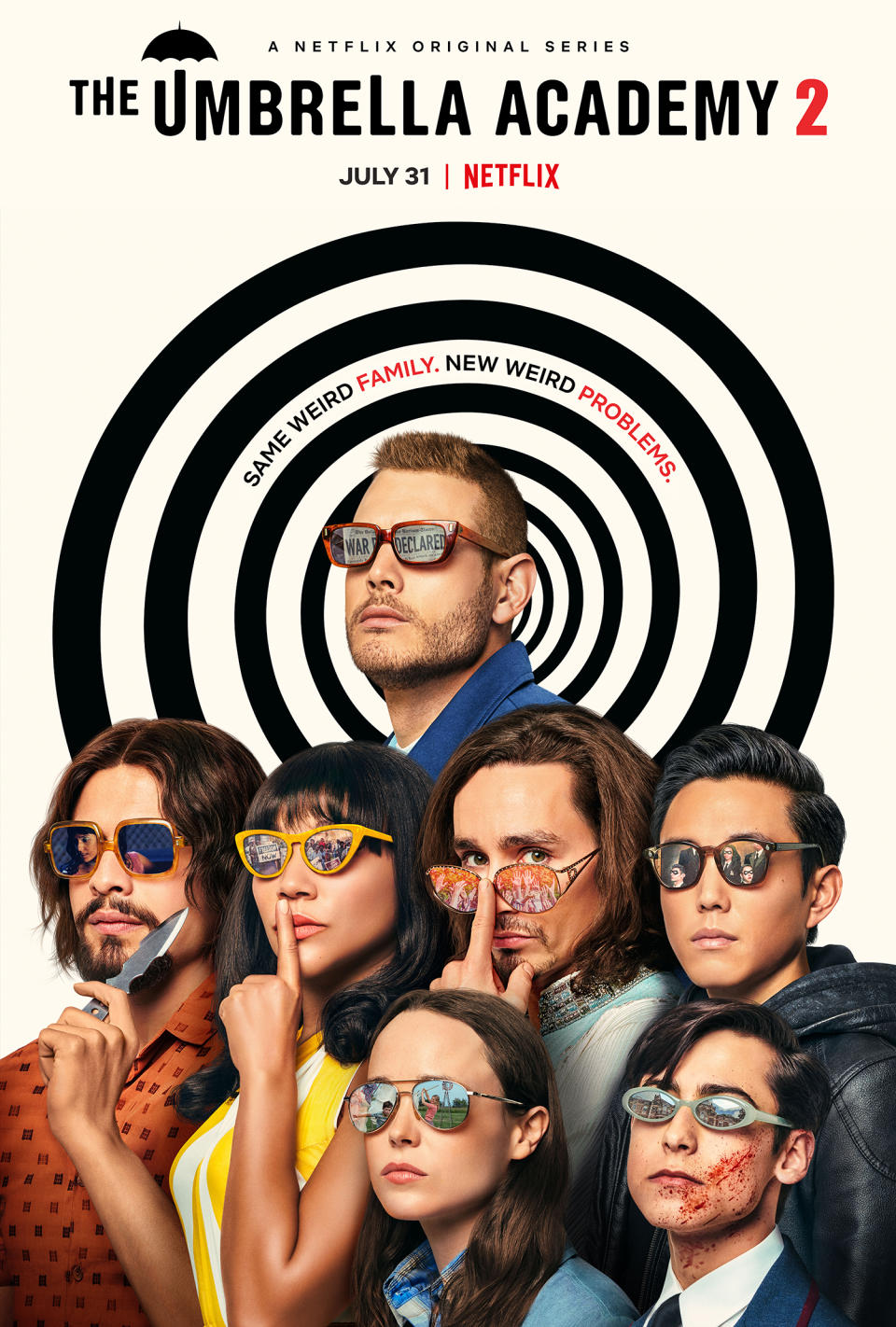
Remember, for them, they've only been together 20 days. Each of the seasons is only 10 days long, even though they've had time apart now between both, because they were all split apart after season one and now they've come back together, they're stronger together. Now, let's see if they can keep that up.
What themes would you like to explore further in a third season?
I'd like to put some characters together who don't normally spend a lot of time together. I'm fascinated with Allison and Diego, who don't spend a lot of time together. And I haven't done a lot of Luther (Tom Hopper) and Vanya (Ellen Page). Allison and Klaus have spent some time together, but not a lot. I'd like to try new pairings of people and see how the dynamics play out.
The Umbrella Academy season 2 launches exclusively on Netflix 31 July, 2020.

 Yahoo Movies
Yahoo Movies 
